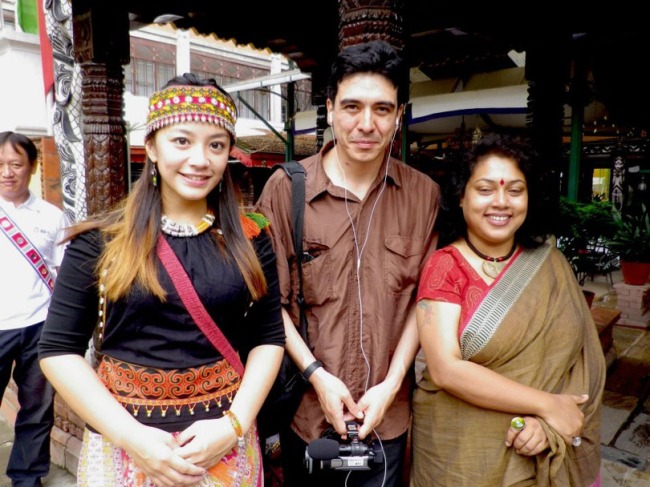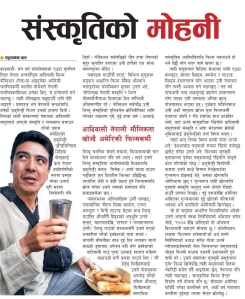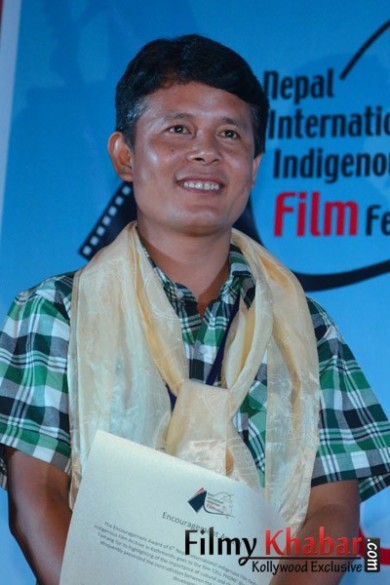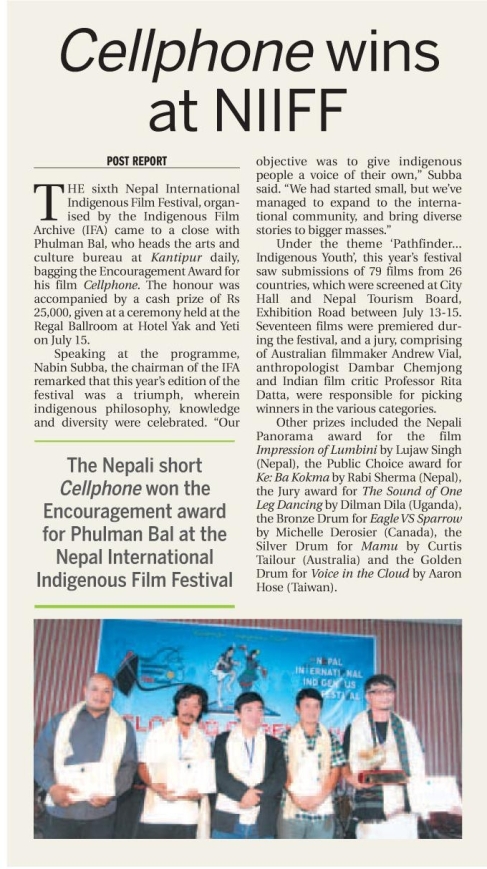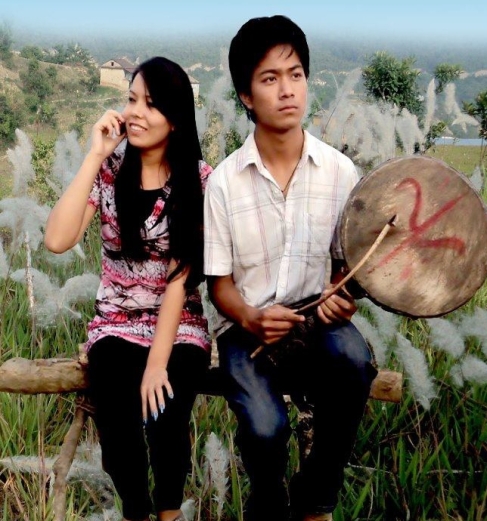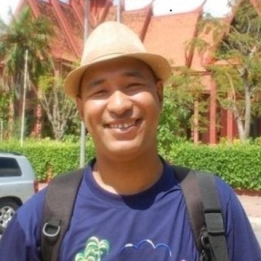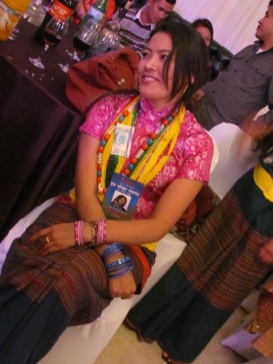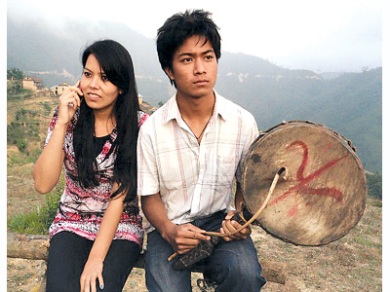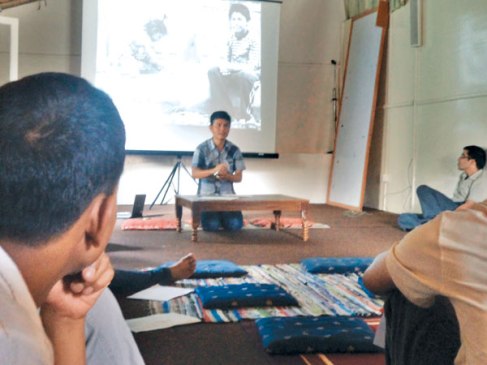
Photo: Jhala Biswokarma
Phulman Bal
A kachahari play on loktantra has just finished showing in Kachanali village situated on the banks of the Seti River in Doti district of far western Nepal. The locals returned home discussing the issues of women’s rights, education and inclusive loktantra raised in the drama.
I spotted a wrinkled old lady with her grandson in a group of old women in their 50s.
“What’s your name?” I asked, intending to find out her impression of the play.
“Why do you want to know?” she shot back. “We illiterate people don’t have names. Go ask the educated people.”
The old woman then headed towards her home, muttering something in Doteli language which I could not understand. My question had angered her; it was writ large in her face.
Just then, Yogendra Malla, a teacher at the local Harihar Secondary School, pulled me by the arm and said, “Most of the village women are uneducated, and they don’t speak Nepali, only Doteli.”

photo: Dil Bahadur Chhatyal
A documentary is about to be shown in the school’s under-construction building. Many women and children have gathered to watch it. According to Malla, there are not many men because most fled to India during the conflict; and there is little hope of them returning except during festivals.
The documentary, Newsroom Bahira, is about an incident in Achham caused by unsafe abortion practices. A woman lies writhing in pain inside a hospital and dies after some time. Two years ago, a woman had died after a hot iron rod was inserted into her genitals to cause abortion.
“We could’ve saved her if there was a hospital nearby,” Malla commented after watching Dilbhushan Pathak’s documentary. “This is the misfortune of the far west.”
Parvati Malla, 46, of Kachanali VDC was listening to him as she clutched her child in her arms. She had come to see the film after watching the play.

Photo: Dil Br. Chhatyal
“The men don’t understand our problems,” she said. “Most of them go to work in Indian cities. Many return home infected with HIV and forcefully transmit the disease to their wives. If we have many children and want to have an abortion, we have no access to such service.”
Just a while ago, Parvati had been watching in silence when Silgadhi’s Abhiyan Sanskritik Samuha was staging the play. Only after the show did she start speaking openly, the chief reason being the play’s interactive style.
Propagated in the 1970s by Brazil’s innovative and influential theatrical director, writer and politician Augusto Boal as “Theater of the Oppressed”, this drama style connects the audience directly with the stage and creates an environment for finding solutions to one’s problems.
For example, the play has a scene where a Dalit girl is grazing her goats. She becomes thirsty and heads towards a tap by the roadside. When she is about to cup her hands to drink water, someone shouts, “She’s made the tap impure, this wretch!”
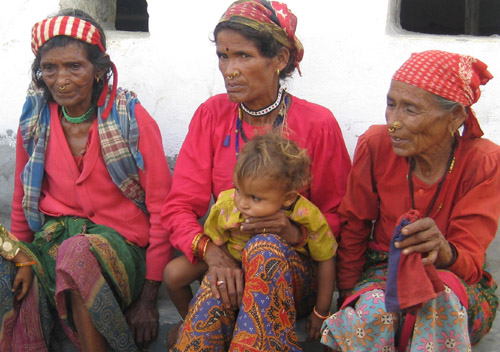
Photo: Dil Br. Chhatyal
The girl would not go without getting water, and they kept arguing for a long time. The narrator then stopped the play and threw a question at the audience, “Should the girl get to drink the water or not?” They shouted back, “Yes!”
Parvati also started voicing her opinion. “Yes, times have changed now. Why should people be treated as untouchables?”
Rukmini Shahi, 23, who represents the new generation, climbed on to the stage and pushed aside the man from the so-called upper caste who had been protesting against the Dalit girl.
In this style of drama, artistes weave problems of the local people into the story, and when the confrontation between the characters reaches a climax, the narrator asks the audience for a solution. The viewers then turn into characters and the problem is solved together.
Problems arose twice again in the play — in the scene involving a village girl and her trafficker and in the scene of the village council meeting. In both instances, the villagers actively participated to devise solutions, from chasing away the girl trafficker to uniform budget allocation and inclusive leadership for the village’s development.
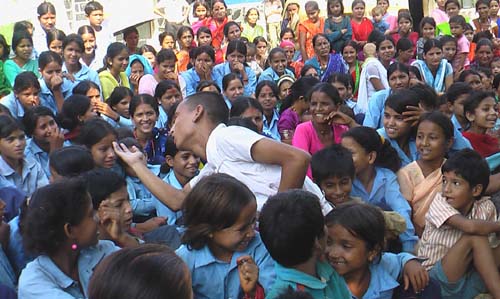
Photo: Dil Br. Chhatyal
This style of drama, which aims at active audience participation rather than imposing ideals from the stage, is being staged in various villages of Doti these days. The campaign, conducted by Alliance for Peace as part of MS Nepal’s “Sthaniya Loktantra Nirman” program, has reached Doti via Palpa and Banke.
“It’s not enough to have loktantra in the constitution and leaders’ speeches. It should be the way of life of every citizen. Loktantra can’t be long-lasting if we don’t spread awareness to the local level,” program coordinator Ramesh Adhikari said. “That’s why we’ve started this campaign.”

Group Members of Loktantra Bus Campaign. Photo: Jhala Biswokarma
Yogendra Malla also seconded his views. The 23-year-old teacher was willing to help take the play to another village nearby.
In parting, he said to the play’s director Milan Pariyar and team coordinator Rajkumar Pathak, “Remember that there are also young people like us in the villages who haven’t fled to India.”

